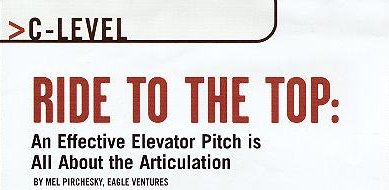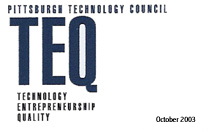|
|
In the News | |


Over the years, many of us have seen some great deals with huge potential to make lots of money, but it was nearly impossible for them to raise any initial capital, except in the crazy late 1990s/early 2000.
In the real world, there are more average/good deals out there than there is money to fund them. However, there is way, way more money out there than truly great deals. It always has been, and likely always will be.
If you have a great deal (i.e., a sustainable competitive edge, large validated market, a great CEO, good business model, etc.) and you are not able to raise capital, it's not due to a lack of investable funds. It's also not because your deal isn't a great opportunity (unless you are deluding yourself!). The only thing left is how you are articulating your deal. That's where the art and science of fundraising converge, resulting in a challenging fundraising experience or an impossible one.
The key for all fundraising is not just speaking "x" and having your prospective investor hear "x." The key is to have your listener hear "x" and understand the significance of it to their bones.
Remember, a well-articulated elevator pitch is ultimately more important than a well-written business plan. Your "sale" occurs when you are articulating your opportunity to your prospective investors, not later when they read your plan. If they are not mentally sold, your prospective investors will never read your plan! A good business plan merely becomes part of their due diligence after the mental sale.
Making a well-articulated pitch can be a tall order when all you've got is 60 short seconds (like in an elevator ride alone with a stranger who asks you what you do), but entirely possible with sufficient preparation.
For starters, you need to break down your elevator speech into two parts – the first 10 seconds and the remaining 50. The objective of the first 10 seconds is to have your prospective investor want to listen to the next 50 seconds differently than they would have otherwise.
The first 10 seconds should have two components. One is what you do or your niche, and the other is something that independently validates your value proposition. For example, if you met me for the first time and I told you: "I work with entrepreneurs to help them dramatically improve how they articulate their value proposition," your first thought would likely be something less than ideal from my perspective (e.g., Oh boy, just what I need - another consultant that wants my money!).
If on the other hand I told you, "Having likely raised more money than anyone else in the Pittsburgh area solely from high-net-worth individuals, I work with entrepreneurs to help them dramatically improve how they articulate their value proposition," your mental reaction will more likely be "Tell me more!" (At least I hope so!)
For the next 50 seconds, you must avoid buzzwords and jargon. If you don't, you'll likely lose their attention as they focus on understanding the jargon/buzz-word. If your deal adds value," tell the listener exactly, and in plain language, how it does that. M ore importantly, tell the listener how it can bring value to your customer's life. Don't try to cram too much detail into your 60-second pitch. Your goal is to have the listener want to know more. You don't want to sell the whole thing right then and there; 'ust the core of your great deal.
The last key to your elevator pitch is that you should relate to it as an iterative process. You should continually modify it based on feedback from your listeners. You should feel that you are not done with revising your pitch until the last dollar is in. And, it cannot be overstated that you must practice, practice, practice. Try it out on friends who know nothing about your deal. See if they understand what you're pitching. Get frank feedback and keep trying it out whenever possible.
After all, you never know who you might run into in an elevator or anywhere else who could be a potential investor. Remember, there may very well have been a time when someone happened to mention to Columbus: "Did you ever think of asking Queen Isabella?"... and the world changed right there in that moment!
